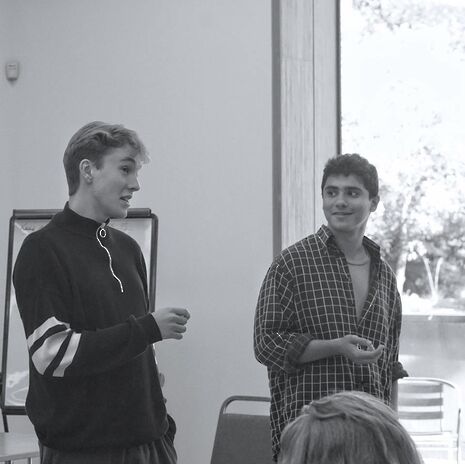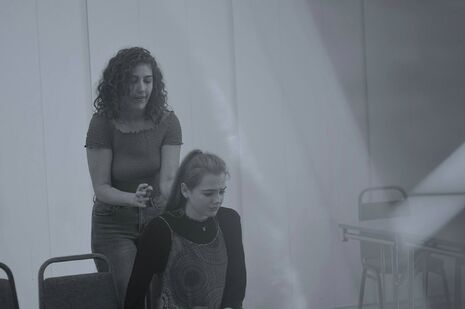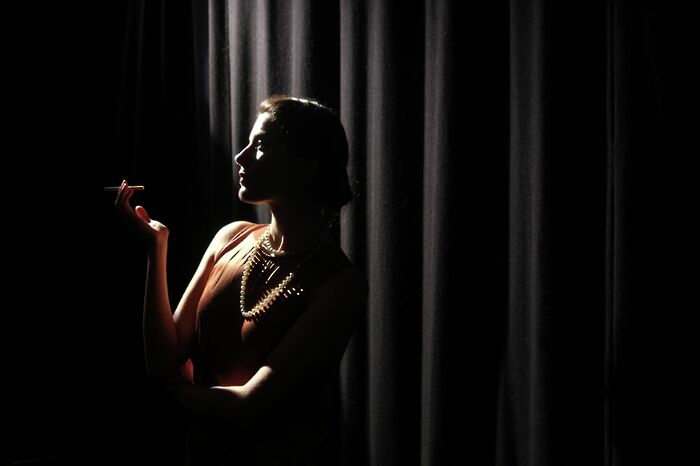The Glass Menagerie preview
Music and memory come together in a stunning evocation of life in pre-war America

‘Time is the longest distance between two places.’ It is these words, realised by Tom Wingfield in Tennessee Williams’ ‘The Glass Menagerie’, running at the ADC this week, which permeate the air of this memory play. Tom invites us into a home where he no longer lives in an era long forgotten to the past; a tenement block in 1930s St. Louis, Missouri. We become witnesses to a part of his life which it seems he’d rather forget: the fraught relationship between himself, his mother Amanda and sister Laura, and the inescapable guilt stemming from his love for (and later, the abandonment of) this small family, as he follows in the footsteps of an absent father, who also ‘fell in love with long distance'.
The ADC has been brilliantly transformed into a microcosm of domesticity by designers Theo Haymann and Gaia Fay, under the intelligent eye of director Megan Harding. Harding
and assistant director Zachary Myers tell me of their desire for the play to inhabit the hazy boundaries between the real and the imagined. We feel we cannot leave the two small rooms
of the Wingfield apartment and its dog-eared attempts at refinement, as our protagonist peers in from his narrative stoop on the fire escape. Yet the strikingly abstract backdrop of painted blue roses is a constant reminder that what we are seeing only exists in the fervent recollection of Tom Wingfield, played by Bilal Hasna.
"The ADC has been brilliantly transformed into a microcosm of domesticity by designers Theo Haymann and Gaia Fay"
Speaking about the complexities of characterisation in his role, Hasna tells me that he keeps an excerpt from Williams’ prose-like stage notes in mind: “Memory takes a lot of poetic licence. It omits some details; others are exaggerated, according to the emotional value of the articles it touches, for memory is seated predominantly in the heart.” It is these values of memory which allow the small cast to slip easily from monologue to dialogue, the poetic licence of their remembered lives offering a poignant and at times heartbreaking intimacy which could not have been accessed in real time.

The play revolves predominantly around the relationship between Amanda and Laura Wingfield (played by Kim Alexander and Ellie Gaunt), and the circumstances which constantly apply pressure to this bond. Their stuffy southern apartment is filled with Amanda’s incessant chatter and Laura’s stoic obedience, as she listens to tall tales of her mother’s past life as a young debutante in Blue Mountain State, a far cry from their stifling tenement.
Amanda is obsessed with the need for Laura to find a husband, a possibility which Laura feels is out of her reach. Cripplingly shy and held back by childhood polio, Laura is caught in the chasm between the independent working woman that her era allows her to be and the housewife that her mother expects. Gaunt speaks to me about the importance of expressing Laura’s desire to balance these tensions of character, and brilliantly executes Laura’s poignant desire for romantic love and daring independence. The exchanges between mother and daughter capture all the familiar frustration and barbed comedy of doting parent and suffocated teenager.
The only disturbance from the outside world comes in the much anticipated visit of Jim O’Connor, the “Gentleman Caller” to the Wingfield home. Jim, played by Leo Benedict, encapsulates all the American dreams of the pre-war period: he takes night classes in public speaking and is learning about electro-dynamics (‘Because I believe in the future of
television!’), and he is the man of Laura’s wildest imagination.
"The exchanges between mother and daughter capture all the familiar frustration and barbed comedy of doting parent and suffocated teenager"
Benedict attests the touching veracity of ‘The Glass Menagerie’ to its personal resonance with the playwright. Tennessee Williams wrote his play – his first great success - a decade or so after the time it describes. It is strongly autobiographical. He was known to friends as Tom, and had an ailing and desperate sister, Rose, who, like Laura, had the obsessional ornamental glass collection of the title. Among the playwright’s other notes he emphasised how music should be an important element of the play, suggestive of nostalgia and private memory. “In memory everything seems to happen to music,” Tom declares, what he calls the “fiddle in the wings”.
This ADC production is accompanied not by a fiddle but by the perfectly-pitched piano playing of Sam Tannenbaum, whose fragments of melodies the characters react and respond
to. The glimpses of the past also happen in pools of (real) candlelight (which director Megan Harding insisted on) sometimes as transient and flickering as Tom’s memory whilst he smokes on the fire escape, or as breakable as the glass animals which Laura so vigilantly keeps.
 News / SU reluctantly registers controversial women’s soc18 December 2025
News / SU reluctantly registers controversial women’s soc18 December 2025 News / CUP announces funding scheme for under-represented academics19 December 2025
News / CUP announces funding scheme for under-represented academics19 December 2025 Features / Should I stay or should I go? Cambridge students and alumni reflect on how their memories stay with them15 December 2025
Features / Should I stay or should I go? Cambridge students and alumni reflect on how their memories stay with them15 December 2025 Fashion / The art of the formal outfit 18 December 2025
Fashion / The art of the formal outfit 18 December 2025 News / Dons warn PM about Vet School closure16 December 2025
News / Dons warn PM about Vet School closure16 December 2025










